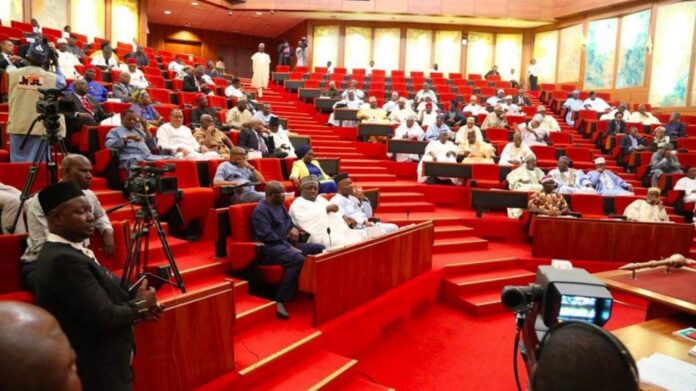The Senate Committee on Agriculture on Wednesday in Abuja said about two million metric tons of rice are currently being imported or smuggled into the country.
This is just as the committee said, in 2021, the production of milled rice in Nigeria was estimated to amount to five million metric tons.
Vice-Chairman of the Committee, Senator Muhammad Enagi, disclosed this at the meeting with a multi-stakeholder group on rice council advocacy bill promotion.
The interactive meeting was organised by the United Nations Development Programme (UNDP) – Global Environment Facility (GEF), in collaboration with Women Farmers Advancement Network (WOFAN), among others.
Enagi stated that Nigeria’s rice rose from 3.7 million metric tons in 2017 to 5.0 metric tons in 2021.
He said; ”In Spite of this, 6.7 million metric tons of rice is consumed in Nigeria annually, resulting in a deficit of about two million metric tons which is either imported or smuggled illegally into the country”.
Enagi stated that he sponsored a bill to establish the National Rice Development Council of Nigeria to provide guidance on the rice research, comprehensive development of the rice sector, and the organization of the rice stakeholders to enhance local production.
The Bill, he said, seeks to establish a rallying point and a comprehensive national operational and governance structure for a complete rice value chain.
According to him, Nigeria should consider putting in place a National Rice Development Council and a comprehensive national rice development roadmap that will guide the country into self-sufficiency and export.
He added that the establishment of the National Rice Development Council will transform the activities of rice farmers, processors, millers, researchers, marketers, and other relevant stakeholders across the rice value chain.
”With our natural competitive advantage in the area of rice production, Nigeria should put in place a National Rice Development Council and a comprehensive national rice development roadmap that will guide us not only into a regime of self-sufficiency in rice production but also for export.
”The Nigerian rice industry exists in the abstract as there appears to be no form of coordination in the absence of a properly structured rallying point. We have Paddy Rice Dealers Association of Nigeria (PRIDAN), Rice Farmers Association of Nigeria (RIMAN), among others.
Earlier, the Executive Director of WOFAN, Dr. Salamatu Garba, expressed concern over the high rate of food importation into the country.
She said the importation of agricultural produce, especially grains, is still witnessed to a higher degree than imagined, leading to worsening food inflation and subsequently fueling hunger, poverty, and insecurity.
“Nigeria’s worsening food insecurity in the wake of climate change challenges, insecurity, low financing of the agriculture sector especially mechanization and poor situation of the country’s research institutions are threatening the economic stability of our nation,” she said.
She noted that the Nigerian Rice Council Advocacy would empower rice farmers to grow more rice in a sustainable way and increase paddy production to 30 million metric tons in five years.
In her remarks, the Project Manager, UNDP-GEF-IAP Resilient Food Security Project, Mrs. Rhoda Dia, said the Nigerian rice revolution will enhance extension and research delivery services to ensure quality control in rice production.
She said the project is in seven states in northern Nigeria, 14 local governments, and 70 communities to achieve long-term sustainability of food security system to build greater community resilience for climate change to help drive for food insecurity.
Dia added that the advocacy will reduce foreign exchange for rice imports.

